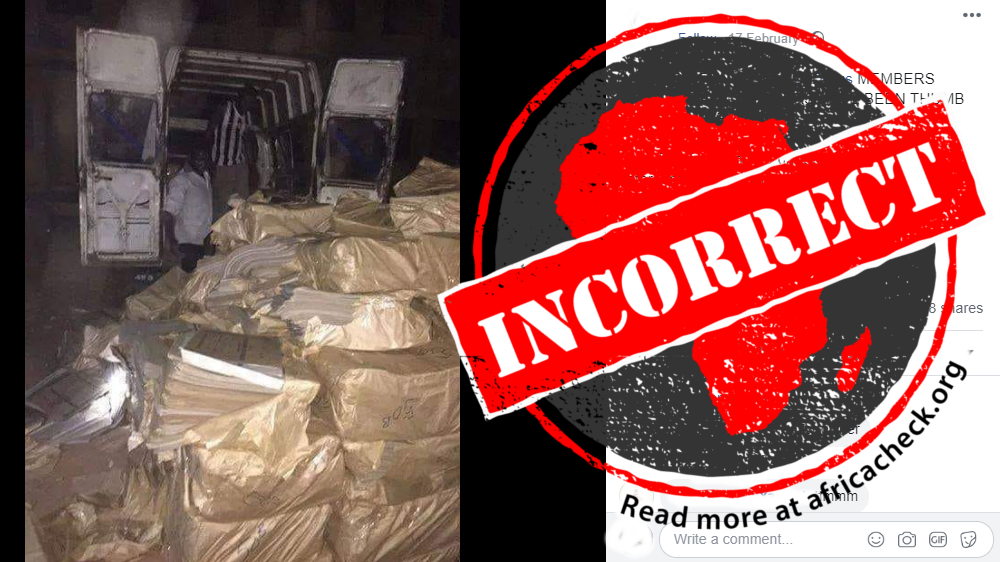On 16 February 2019 Nigeria’s presidential elections were postponed for a week just hours before voting was to start. The front-running candidates are current President Muhammadu Buhari of the All Progressives Congress and Atiku Abubakar of the Peoples Democratic Party.
Within a day a photo claiming votes were being rigged started to circulate on Facebook. It showed a man standing outside a bus with a huge pile of papers. The caption: “A J5 Bus full of thumb printed ballot papers was intercepted by the Nigerian Police in Bida, Niger State yesterday.”
The problem is, the caption had a different preface in different posts, depending on which side the Facebook user supported. Some said: “All the ballot papers have been thumb printed for Buhari.” Others said: “All the ballot papers have been thumb printed for Atiku.”

But the photo couldn’t be of ballots seized by police on the day of the postponed 2019 election because it’s at least four years old.
A Tineye reverse image search shows the photo was first published on the internet in February 2015, when Nigeria held its previous elections. A Google image search reveals a similar date.
A few web posts from February 2015 can be found with unconfirmed reports of a J5 bus full of thumb printed ballot papers being intercepted by Nigerian police in Bida. So while the photo may show vote rigging, it’s not from Nigeria’s 2019 elections. – Mary Alexander (21/02/19)
Within a day a photo claiming votes were being rigged started to circulate on Facebook. It showed a man standing outside a bus with a huge pile of papers. The caption: “A J5 Bus full of thumb printed ballot papers was intercepted by the Nigerian Police in Bida, Niger State yesterday.”
The problem is, the caption had a different preface in different posts, depending on which side the Facebook user supported. Some said: “All the ballot papers have been thumb printed for Buhari.” Others said: “All the ballot papers have been thumb printed for Atiku.”

Photo doing the rounds during Nigeria’s 2015 elections
But the photo couldn’t be of ballots seized by police on the day of the postponed 2019 election because it’s at least four years old.
A Tineye reverse image search shows the photo was first published on the internet in February 2015, when Nigeria held its previous elections. A Google image search reveals a similar date.
A few web posts from February 2015 can be found with unconfirmed reports of a J5 bus full of thumb printed ballot papers being intercepted by Nigerian police in Bida. So while the photo may show vote rigging, it’s not from Nigeria’s 2019 elections. – Mary Alexander (21/02/19)
Republish our content for free
For publishers: what to do if your post is rated false
A fact-checker has rated your Facebook or Instagram post as “false”, “altered”, “partly false” or “missing context”. This could have serious consequences. What do you do?
Click on our guide for the steps you should follow.
Publishers guideAfrica Check teams up with Facebook
Africa Check is a partner in Meta's third-party fact-checking programme to help stop the spread of false information on social media.
The content we rate as “false” will be downgraded on Facebook and Instagram. This means fewer people will see it.
You can also help identify false information on Facebook. This guide explains how.





Add new comment